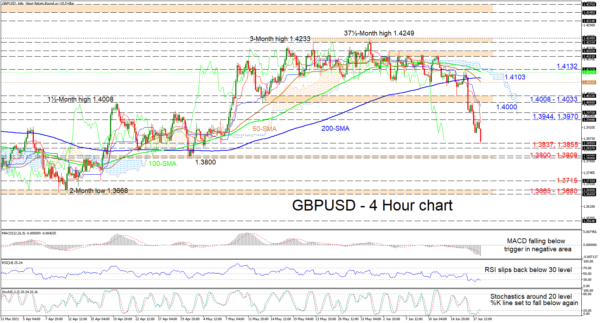GBPUSD continues to freefall from the 1.4100 area and far below the 200-period simple moving average (SMA), as the after-effects of Wednesday’s hawkish FOMC meeting seem to be lingering. The rolling 50- and 100-period SMAs are reinforcing the drop in the pair, which would be confirmed by a negative crossover of the 200-period SMA by the 100-period SMA.
The diving Ichimoku lines and the short-term oscillators are demonstrating that negative momentum is growing. The MACD, far below zero, is falling further beneath its red trigger line, while the RSI has redirected back into oversold territory. The stochastic oscillator is flirting with the 20 level, but its %K line appears ready to repower negative momentum.
The decline in the pair has continued this morning and is testing the lows of 1.3855 and 1.3837 from the early part of May. If negative pressures persist and steer the pair beneath these obstacles, the critical 1.3800 handle could attempt to counter the decline. If this defence breaks down too, the pair may snowball towards the trough of 1.3715 in mid-April, before challenging the 1.3665-1.3680 floor.
Even if the pair manages to mould a foothold at these lows in May, significant buying interest would need to evolve to shift sentiment to the upside given that initial limitations are more than a basis point higher than the pair’s current location. If buyers manage to navigate past the 1.3944 and 1.3970 barriers, heavy resistance from 1.4000 until 1.4033 could finally subdue their efforts. However, additional gains could then encounter a section of resistance from the 50-period SMA, currently at 1.4083, until the 1.4132 high from where the pair lost its stability.
Concluding, GBPUSD is deteriorating and attempts to treat its wounds seem to be in vain at this point. That said, to safeguard the short-term positive picture, the pair would need to hold above the 1.3800 hurdle, while a shift below the 1.3665-1.3680 base could shift the bias to strongly bearish.

